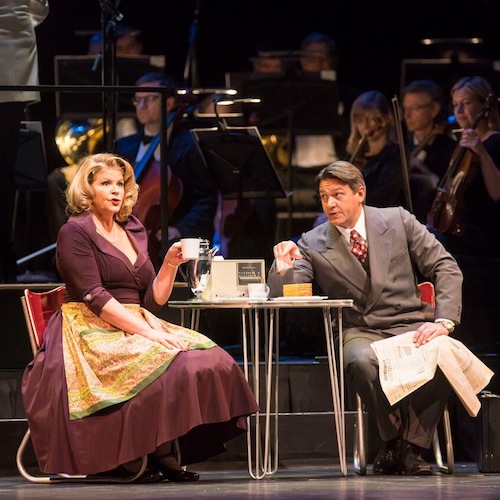Lyric Opera highlights Bernstein’s yearning lost souls in centennial tribute

Judged solely by the evening’s title, Lyric Opera of Chicago’s “Celebrating 100 Years of Bernstein” concert Saturday night at the Lyric Opera House had all the makings of a predictable evening.
Bernstein, who died in 1990 at age 72, was indeed a composer/conductor/author/lecturer worth celebrating. Composer of West Side Story, music director of the New York Philharmonic, an engrossing proselytizer for all kinds of music from Mahler to Miles Davis, he was internationally known, a pop celebrity, a crossover artist in the most sophisticated sense of the term. Saturday’s concert—stellar soloists in a bit of Bernstein opera and a smattering of Bernstein on Broadway—could have added up to little more than a pleasant homage to the beloved Lenny.
But Lyric’s choice of repertoire–pairing Bernstein’s one-act opera from 1952, Trouble in Tahiti, with mostly lesser known songs from his Broadway shows and elsewhere—offered something much more satisfying. A theme emerged organically from the music: Bernstein’s ongoing fascination with restless characters yearning for a time and place where they could finally find peace and be themselves.
That longing was unmistakable throughout the evening, from the arias and duets of the unhappily married couple Sam and Dinah (Nathan Gunn and Susan Graham) in Trouble in Tahiti to “Somewhere,” Tony and Maria’s fantasy of better days to come from West Side Story sung by Broadway star Kate Baldwin. David Chase, a Broadway veteran who conducted Lyric’s three most recent musical theater productions. was onstage with Lyric’s orchestra and provided succinct, lively commentary.
Touble in Tahiti is Bernstein’s infuriated indictment of middle-class, mid-20th century suburban life, and Graham and Gunn created vivid portraits of the opera’s passive-aggressive, sometimes baffled, marital combatants. The minimal staging was evocative: a metal kitchen table with vinyl-covered chairs, low-slung sofas. In her full-skirted dress and pearls, Graham looked like a suburban matron straight out of TV’s Mad Men, and Gunn was the very image of a confident young executive in his spiffy three-piece suit.
Gunn’s deep, rich baritone brought an undercurrent of menace to Sam’s harsh soliloquy praising the inevitable dominance of men who are “winners.” Describing Dinah’s dream of a serene garden, Graham’s mezzo-soprano was luminous and tender. Most affecting were the couple’s melancholy duets. Both wanted exactly the same thing from each other—a loving touch, a tender word—but could never find the words to express their longing.
Periodically a bright-voiced trio (Diana Newman, Josh Lovell and Emmett O’Hanlon, from Lyric’s Ryan Center) broke into jazzy patter extolling the pleasures of suburbia—“white picket fence! Washer and dryer!” With their sunny smiles and suave dance steps, they offered a cruel, up-tempo contrast to Sam and Dinah’s deep discontent.
One of the pleasures of Trouble in Tahiti was hearing Bernstein working his way forward to West Side Story. With its bursts of Latin rhythms, full-throated lyricism, be-bopping jazz and dark-hued dissonance, Tahiti strongly hinted at musical ideas that would crystalize so brilliantly in Bernstein’s Broadway megahit five years later. Like seeing a painter’s rough sketch or a poet’s first draft, Saturday’s concert gave us a glimpse of a composer working his way to bigger and better things.
The pleasures continued after intermission. Baldwin—the vibrant star of Lyric’s The King and I and currently on Broadway in Hello, Dolly!—was just as enchanting in several Bernstein songs. Sassy and zany in the racing tempos of “I Can Cook, Too” from On the Town, she sent pure, high notes into the vast opera house in the more lyrical “Somewhere” and “A Little Bit in Love” from Wonderful Town.
Gunn was hilarious as the pompous, needy Captain Hook in a soliloquy from Peter Pan. Outfitted in a ridiculously long, curly wig, he strutted and preened, booming out his complaints with zest. Barely skipping a beat when his hook accidently speared his leg, then his hair, he was unbowed in his need to command.
The concert closed with all of the soloists and five Ryan Center artists in another Bernstein meditation on the temporal, “Some Other Time,” from On the Town. They strolled the stage like old friends, noting the things they had not had time to do, but certain that they could “catch up, some other time.” A fitting finale for a concert exploring Bernstein’s singular vision of time and place.
Posted in Performances





Posted Mar 11, 2018 at 11:45 pm by C.Bolton
We attended the Bernstein Centennial last Saturday. The performance of Trouble in Tahiti was excellent. The second half, featuring selections from the Bernstein songbook was rather puzzling, i.e. the choice of songs performed. Why so many obscure and/or seldom performed songs? Aside from I Hate Music and Somewhere, that is.
Posted Mar 13, 2018 at 2:04 pm by Peter DG
The Bernstein show was quite delightful, highlighting Lyric’s capabilities beyond grand opera. Too bad they only did one performance. Judging by the crowd – lots of young people – they cold have filled the hall for many performances. We really enjoyed the variety in second half – the “Tahiti” opera was rather stereotyped.
My only gripe was the amplification. I like to sit up front and hear the singers live. It’s unnerving to hear the voice from a speaker on the side of the stage with the singer right in front of you. We know these singers have the power to fill the house with their own voice. Then again with the amplification every word was quite clear – you didn’t need to look at the super-titles.